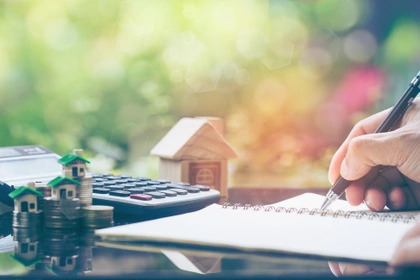1. Check your credit report
When you apply for a mortgage, lenders usually check your credit report to see how responsible a borrower you are and decide how risky it’d be to lend you money.
So before you apply, we suggest that you check your credit report with the three main credit reference agencies in the UK, Experian, Equifax and TransUnion. You need to make sure your report is accurate and up to date to show lenders that you are consistent and trustworthy.
Any errors on your report could lower your credit score and show up as red flags to lenders, making it more difficult to get approved. Also, mismatched information could cause delays if your lender decides to investigate it further.
You can avoid these potential problems by contacting your creditors and the credit reference agencies to correct any mistakes on your credit report before you apply.
If your credit score is lower than you’d like, you could consider building up your score before applying for a mortgage. By doing so, you could increase your chances of getting accepted in the future, and with potentially lower interest rates. There are plenty of ways to improve your score. You can:
- Register on the electoral roll
- Sign up to the Rental Exchange Initiative
- Remove old financial links with bad credit histories
- Set up direct debits so you don't miss any bill payments
- Reduce your debts to show you are a responsible borrower
- Don’t make multiple credit applications in the run-up to your mortgage application
2. Make sure your ID and proof of address is up to date
As part of the application process, you’ll need to provide proof of your identity and address. Lenders require this to prevent fraud and to confirm you are who you say you are.
It’s a good idea to get your paperwork ready and check it’s up to date, to make sure you’re one step ahead.
If for example, your passport or driving licence has expired - or your name or address has changed, you’ll need to get your ID renewed. It’s best to do this straight away, as it can take several weeks to receive new documents through the post, which could hold up your mortgage application.
The documents you’ll be asked for will vary from lender to lender, but typically include:
- Passport - not expired
- Driving licence - not expired
- Council tax bill - must be recent
- Utility bills from the previous three months (excluding mobile phone bills, car insurance policies and TV licence statements).
- Bank statements from the previous three months (some lenders may accept statements that you’ve printed off the Internet yourself, but most prefer hard copies provided by your bank)
This list is not exhaustive. The documents you’ll be asked for will vary depending on the lender and your individual circumstances. Also, be mindful that lenders will usually want to see original documents, not copies.
3. Register on the electoral roll
Mortgage providers will also verify your identity by checking the electoral roll. If you have registered to vote, it will show that you are reliable with a stable address. It’s important to appear consistent, as the less risky you come across, the more likely you are to get approved for a mortgage.
On the other hand, if you aren’t on the electoral roll this could hinder your chances of getting any kind of credit. It only takes five minutes to sign up online, or you can register via the post.
To be eligible to vote in the UK, you must be aged 16 years or over, and a British, Irish or EU citizen with a permanent address. Or a Commonwealth citizen who is permitted to enter or stay in the UK.
If you don’t match these criteria, consider updating your address with the three main credit reference agencies in the UK (Experian, Equifax and TransUnion) instead. They can add a note to your credit report to reassure lenders that you can provide proof of your address if this is the case.
4. Provide evidence to support your deposit
Aside from proof of ID and address, mortgage providers also ask for evidence to support your deposit. They require this for anti-money laundering purposes.
Here are some common deposit sources and the types of documents you might need to supply:
- Savings - you’ll usually need to provide at least three month’s worth of bank or savings statements.
- Gift - you may need to get a signed and dated letter from the person who has given you the gift, confirming the amount of money they’ve gifted and the fact they don’t want to be repaid. Sometimes other documentation is also needed (like their ID) to cross-reference their signature.
- House sale - you’ll need to provide specific documentation relating to the house sale to show where your deposit has come from.
The exact paperwork they need from you largely depends on their own criteria and the source of your deposit. This list just gives you an idea so you can get the ball rolling.
5. Present proof of income
One of the most important factors that lenders take into account is your affordability. They need reassurance that you can afford the monthly mortgage repayments on top of your current bills.
Remember, if you were to fall behind with your mortgage repayments, then your home could be repossessed, as a last resort. So, you need to make sure that you only borrow what you can afford to repay. Also bear in mind that the more you borrow and the longer your mortgage term, the more interest you’ll pay in total.
So the mortgage provider will ask you for proof of income as evidence of this. You may also be asked to supply:
- Latest three months' worth of wage slips (they may ask you for older wage slips, for example, if you earn an annual bonus)
- Latest three months' worth of bank statements
- Latest benefits award letter or other proof of benefits
- Most recent P60 from your employer
- Last two or three year’s worth of SA302s from HMRC if you’re self-employed
Again, this list is not exhaustive as each lender follows its own guidelines. But it’s worth gathering together whatever proof of income you have can save you time further down the line.
Remortgage to reduce your outgoings by £100s per month
- We compare 100s of mortgage deals
- Get FREE no obligation, expert advice
- Get extra cash for other purposes
Mortgages are secured against your property. This means your home may be at risk if you fall behind with your mortgage repayments.
Note, the more you borrow and the longer your mortgage term, the more interest you'll pay in total.
Disclaimer: We make every effort to ensure content is correct when published. Information on this website doesn't constitute financial advice, and we aren't responsible for the content of any external sites.






